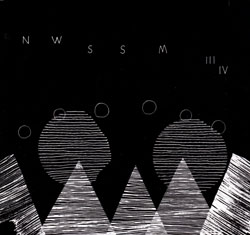
This double-disc set contains two performances of versions of Wooley's large scale piece, one from 2011 and one from a little more than two years later, both recorded live at Issue Project Room in Brooklyn.
The first (III) is a septet of Wooley (trumpet, amplifier, tape), C. Spencer Yeh (amplified violin), David Grubbs (electric guitar), Chris Corsano (drums), Paul Lytton (drums), Matt Moran (vibraphone) and Chris Dingman (vibraphone). It grabs you right from the start with ringing vibes, brilliant and dreamy, soon accompanied by droning, grainy violin. The vibes continue their clarion calls as a hazy swell of other instrumentation seeps in, the string drone eventually dominating, soon challenged by the percussion, the general volume on the rise. That turns out to be the structure of the piece, nothing too unusual at all, a smooth arc of quiet to loud to quiet, returning to the vibes at its conclusion. Several of the portions are very attractive (Grubbs' chiming guitar during the fff passages is particularly nice) but one is left a bit wanting, given some compositional expectations.
The second rendition (IV) uses an altered form of the septet, pared down by one, retaining Wooley, Yeh, Moran and Corsano and swapping in Ben Vida (electronics) and Ryan Sawyer (drums). Additionally, the Tilt Brass Sextet is added (three trumpets and three trombones). It starts similarly, with vibes and, this time, brushes and some pinging electronics. Again, the volume begins to well with the violin and some percussion entering but things are taken a step or two more slowly, with greater delicacy in sound layering; the mood is more thoughtful than before. And things then subside again, giving notice that the structure will differ. Sudden percussion blasts signal a rambunctious stage, percolating drums and a cash register-like bell intrude. There's a rough and tumble section here, Wooley's electrified trumpet scratching and clawing, about as close as the ensemble has come as yet to a standard free jazz interlude. It's only just after this section, more than a half hour into the 50-minute piece, that one first encounters the brass sextet, ladling out elegiac tones over the ringing electronics, as though heard from a distance — quite a beautiful feeling. A real sense of power builds up shortly after this, led by the trumpet, reminiscent of those great JCOA orchestras led by Michael Mantler, the heavy brass buttressing the altissimo flights. It's a much more satisfying venture than the earlier session and points the way to very interesting things for the future.
Comments and Feedback:
|



